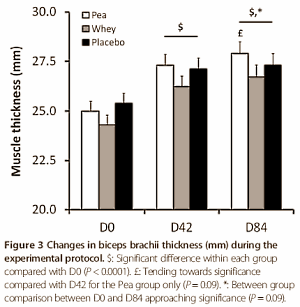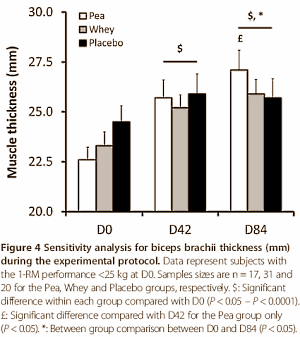Pea protein: a fine way to build up muscle
Pea protein: a fine way to build up muscle
If you do resistance training, then protein shakes made from pea protein work just as well as shakes made from whey protein. Researchers at the French research institute Inserm reached this conclusion in the Journal of the International Society of Sports Nutrition.

Study
The researchers got over 150 men aged between 18-35 to do resistance training for 12 weeks. The men went to a gym three times a week, where they trained the biggest muscle groups in their upper body by doing biceps curls, bench presses and lat pulldowns.
The researchers gave a group of about fifty of the subjects two shakes a day, each containing 25 g pea protein. The product they used was Nutralys, made by Roquette, a French manufacturer of plant extracts. [roquette.com] Roquette funded the study.
Roquette makes a number of different Nutralys products. The researchers used an isolate consisting of 85 percent protein, 7 percent fat and 3 percent carbohydrates.
A second group of about fifty subjects were given two shakes a day, each containing 25 g whey protein. The table above compares the amino acid composition per 100 g of the whey used with that of 100 g pea protein. The nutritional value of the plant-based protein is lower than that of whey, but the amount of BCAAs – and therefore also of leucine – in both preparations is almost the same.
A third group of subjects was given a placebo.
Results
When you do intensive physical exercise endorphins are released: these are natural painkillers, which also give you a feeling of wellbeing. Some athletes even experience a high. That's why the researchers were able to inflate the blood pressure cuff several tens of mmHg more after the rowers' workout than they had during the initial measurement.
D0 = Just before the start of the training period; D42 = after 6 weeks; D84 = after 12 weeks.

The researchers also looked separately at the effects of the pea protein on the experimental subjects who, before starting training, had least strength in their biceps. These were men who had never done weight training before, or men who had not trained for a while. Out of this group, the ones who consumed pea protein gained significantly more muscle than the men in the other groups.

Explanation
"The lack of statistical difference between Nutralys and whey may be attributed to the quite similar amino acids content but also to the kinetic of digestion", the researchers wrote.
"Whey protein has a fast kinetic of digestion, bringing rapidly high concentration of amino-acids in plasma after ingestion, but this effect is transient and returns to resting levels within 2-3 h. Nutralys is an intermediate profile fast protein (unpublished observations) and it can be assumed that the amino acid content in blood plasma would increase quickly after ingestion, making it readily and long lastingly available in the body to participate in muscle protein synthesis."
"In addition, based on its protein digestibility-corrected amino acid score, Nutralys pea protein has shown that it is a high nutritional quality protein with an index of 92.8 percent out of a maximum 100 percent [Agro Food Industry Hi-Tech. 2012;23:8–10.] corresponding to the values of whey or casein, while fruit proteins have a mean value of 76 percent and cereal proteins 59 percent."
Source:
J Int Soc Sports Nutr. 2015 Jan 21;12(1):3.
Pea protein: a fine way to build up muscle
If you do resistance training, then protein shakes made from pea protein work just as well as shakes made from whey protein. Researchers at the French research institute Inserm reached this conclusion in the Journal of the International Society of Sports Nutrition.

Study
The researchers got over 150 men aged between 18-35 to do resistance training for 12 weeks. The men went to a gym three times a week, where they trained the biggest muscle groups in their upper body by doing biceps curls, bench presses and lat pulldowns.
The researchers gave a group of about fifty of the subjects two shakes a day, each containing 25 g pea protein. The product they used was Nutralys, made by Roquette, a French manufacturer of plant extracts. [roquette.com] Roquette funded the study.
Roquette makes a number of different Nutralys products. The researchers used an isolate consisting of 85 percent protein, 7 percent fat and 3 percent carbohydrates.
A second group of about fifty subjects were given two shakes a day, each containing 25 g whey protein. The table above compares the amino acid composition per 100 g of the whey used with that of 100 g pea protein. The nutritional value of the plant-based protein is lower than that of whey, but the amount of BCAAs – and therefore also of leucine – in both preparations is almost the same.
A third group of subjects was given a placebo.
| |
When you do intensive physical exercise endorphins are released: these are natural painkillers, which also give you a feeling of wellbeing. Some athletes even experience a high. That's why the researchers were able to inflate the blood pressure cuff several tens of mmHg more after the rowers' workout than they had during the initial measurement.
D0 = Just before the start of the training period; D42 = after 6 weeks; D84 = after 12 weeks.

The researchers also looked separately at the effects of the pea protein on the experimental subjects who, before starting training, had least strength in their biceps. These were men who had never done weight training before, or men who had not trained for a while. Out of this group, the ones who consumed pea protein gained significantly more muscle than the men in the other groups.

Explanation
"The lack of statistical difference between Nutralys and whey may be attributed to the quite similar amino acids content but also to the kinetic of digestion", the researchers wrote.
"Whey protein has a fast kinetic of digestion, bringing rapidly high concentration of amino-acids in plasma after ingestion, but this effect is transient and returns to resting levels within 2-3 h. Nutralys is an intermediate profile fast protein (unpublished observations) and it can be assumed that the amino acid content in blood plasma would increase quickly after ingestion, making it readily and long lastingly available in the body to participate in muscle protein synthesis."
"In addition, based on its protein digestibility-corrected amino acid score, Nutralys pea protein has shown that it is a high nutritional quality protein with an index of 92.8 percent out of a maximum 100 percent [Agro Food Industry Hi-Tech. 2012;23:8–10.] corresponding to the values of whey or casein, while fruit proteins have a mean value of 76 percent and cereal proteins 59 percent."
Source:
J Int Soc Sports Nutr. 2015 Jan 21;12(1):3.
